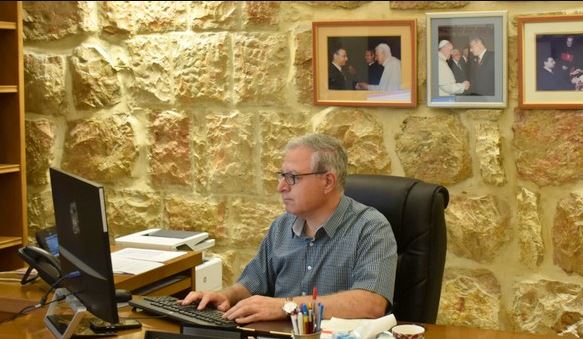INTERVIEW – On June 14, 2017, H.E. Archbishop Pierbattista Pizzaballa appointed Mr. Sami El-Yousef as the first lay person to assume the position of Chief Executive Officer of the Latin Patriarchate. During an interview, Mr. Sami reflected on this new change and the work to be implemented in the future.
On September 1, 2017, you became the first lay person to assume the position of Chief Executive Officer of the Latin Patriarchate. What do you hope that this change will bring to our diocese?
It was a great honor to be asked to be the first lay administrator to assume the position of Chief Executive Officer of the Latin Patriarchate. Though there has been a trend within the universal church to turn over such responsibilities to lay leadership, on our local scene which is overburdened with history and tradition this constitutes a major and historic change. It is my hope and dream that this change will bear fruit and the emerging partnership and shared responsibility between the religious and lay leadership will lead the Latin Patriarchate to new highs and position it ideally to serve our local community. Thus, teamwork will be key in the coming period as no one can succeed alone without the collective efforts of all our committed staff and collaborators.
Throughout your professional career, you assumed many positions within the institutions of the Catholic Church in the Holy Land, could you talk to us about your background and work experiences?
By way of a personal introduction, I am a native of the Old City of Jerusalem and have worked for most of my professional career for the institutions of the Catholic Church in the Holy Land. After completing my university education in the United States, I returned to Palestine in 1980 and started working at Bethlehem University in various positions over two periods for a total of 24 years. There I assumed a number of responsibilities including teaching assistant; lecturer; dean of faculty of business administration; assistant vice president for academic affairs; and finally, the first lay person to assume the duties of vice president for finances and planning from 2000-2009. Feeling the heavy burden of administration and routine work, I moved to a new line of work as I joined the CNEWA* – Pontifical Mission for Palestine (PMP) office team in Jerusalem in 2009 as the second lay regional director for Palestine and Israel. There I was exposed to humanitarian and development work and was involved in institutional support to tens of mostly Christian institutions providing quality services to marginalized communities in the sectors of education, health, and social services.
How will you incorporate your work experiences in your new duties as Chief Executive Officer at LPJ?
After eight years at CNEWA – PMP, I again felt that now is a time of change for me personally as I’m called to tackle the challenges and opportunities at the Latin Patriarchate given the nature of the services it offers. At LPJ, I will combine my administrative and financial management experience acquired at Bethlehem University along with the humanitarian and development experience of CNEWA – PMP. Not only is the Latin Patriarchate the local church with a diocese covering four countries in the Holy Land, but its services are rich through its many institutions of service in a number of sectors, most notably in the area of education through a network of 45 schools in Jordan, Israel and Palestine. In addition, we should not underestimate the humanitarian, medical, scholarship and pastoral support provided to thousands on an annual basis nor the centers that provide quality services ranging from senior citizens in Taybeh to severely disabled children in Amman to mention just a few.
As we look to the future, it is certainly a promising one with the aim of better supporting the Christian communities where we operate with special focus on the marginalized, weak, poor and neglected.
What role do lay people play in the institutions of the Church?
As I have said frequently, lay people are guests at the institutions where they serve. Some stay for a short period while others for a much longer period. Some leave a great impact on their institutions while others leave no impact. Eventually we all pass on and the institutions stay and grow and continue to provide quality services. Thus, our obligation is to act professionally and faithfully, build on the foundations laid down by so many hard-working people who served before us, and prepare the way for those who will succeed us in order to continue the building process. Thus, maintaining high ethical and moral professional standards based on the values our savior taught us will be the key to our success and that of the institutions we serve.
Please pray for all of us so that our work continues to be guided by the Christian values so dear to our hearts and the Holy Spirit.
* CNEWA= Catholic Near East Welfare Association
Source: Latin Patriarchate of Jerusalem






